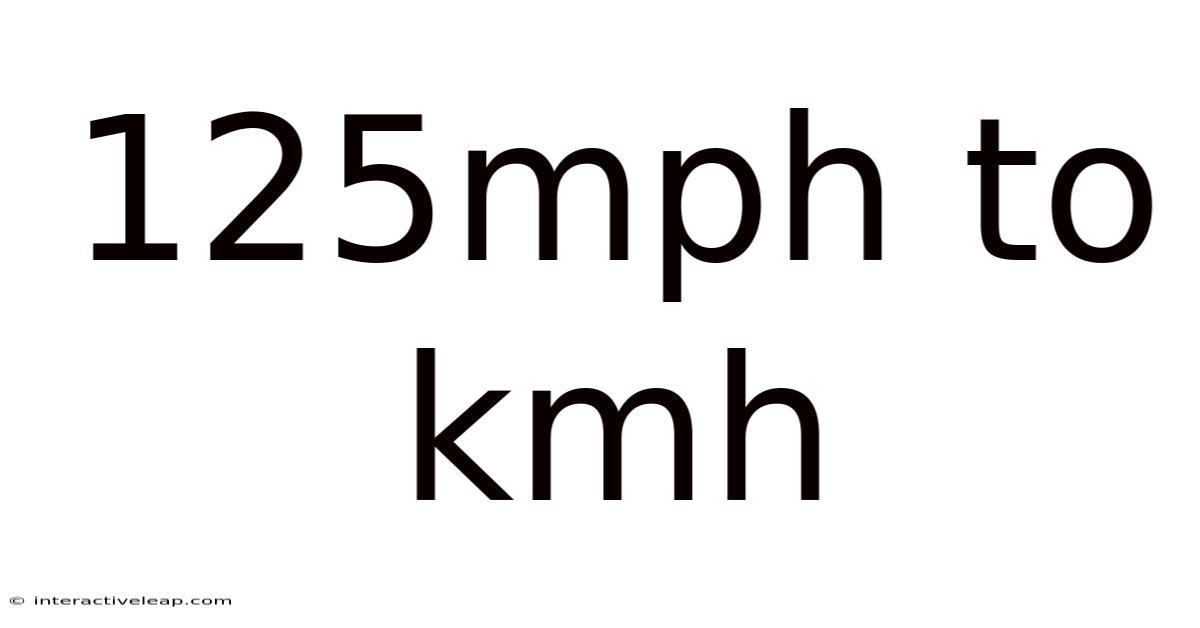125mph To Kmh
interactiveleap
Sep 21, 2025 · 4 min read

Table of Contents
Converting 125 mph to km/h: A Deep Dive into Unit Conversion and its Applications
Are you curious about how fast 125 mph is in kilometers per hour (km/h)? This seemingly simple conversion problem opens the door to understanding fundamental concepts in unit conversion, the importance of accurate measurements, and the applications of this knowledge in various fields. This comprehensive guide will not only provide the answer but also delve into the methodology, explore the practical significance of speed conversions, and address frequently asked questions.
Introduction: Understanding the Need for Unit Conversion
The world uses different systems of measurement. The United States predominantly uses the imperial system, employing units like miles per hour (mph) for speed, while much of the rest of the world uses the metric system, with kilometers per hour (km/h) as the standard speed unit. This difference necessitates unit conversion – the process of changing a measurement from one unit to another while maintaining the same value. Accurately converting speeds, especially in situations involving transportation, safety regulations, and scientific research, is crucial. Incorrect conversions can lead to serious consequences, highlighting the importance of mastering this skill. This article focuses specifically on converting 125 mph to km/h, providing a detailed explanation and broader context.
The Conversion Process: From Miles to Kilometers
The core of the conversion lies in understanding the relationship between miles and kilometers. One mile is approximately equal to 1.60934 kilometers. This conversion factor is the key to transforming 125 mph into its km/h equivalent.
Step-by-Step Calculation:
-
Start with the given speed: 125 mph
-
Apply the conversion factor: Multiply 125 mph by 1.60934 km/mile. This effectively replaces the "miles" unit with "kilometers," maintaining the speed's magnitude.
-
Perform the calculation: 125 mph * 1.60934 km/mile = 201.1675 km/h
-
Round to appropriate significant figures: Depending on the context, you might round the result. For most practical purposes, rounding to one decimal place is sufficient, giving us 201.2 km/h. Therefore, 125 mph is approximately equal to 201.2 km/h.
Beyond the Calculation: Understanding the Significance
The conversion of 125 mph to 201.2 km/h is more than just a mathematical exercise. It has significant implications in various fields:
-
International Travel and Transportation: Understanding speed conversions is essential for navigating international roads and understanding speed limits in different countries. A seemingly small difference in speed can have significant consequences in terms of travel time and safety.
-
Aviation: Aviation relies heavily on precise unit conversions for navigation, air traffic control, and safety regulations. Errors in conversion can be catastrophic.
-
Scientific Research: Scientific studies often involve data from various sources, using different measurement systems. Accurate unit conversions are vital for data analysis and drawing accurate conclusions.
-
Engineering and Design: Engineers use unit conversions extensively in designing vehicles, aircraft, and other machines to ensure compatibility and safety across different regions.
-
Everyday Life: Even in daily life, understanding unit conversions can be helpful, especially when dealing with maps, recipes, or comparing prices of goods with different unit sizes.
Further Exploration: Different Conversion Methods
While the direct multiplication method is straightforward, other approaches can be used to perform the conversion:
-
Using Online Converters: Numerous online tools are available for quick and accurate unit conversions. These tools often handle complex conversions easily and offer a convenient way to verify calculations.
-
Proportion Method: This method sets up a proportion using the conversion factor. For example: 1 mile / 1.60934 km = 125 mph / x km/h. Solving for x gives the same result as the direct multiplication method.
-
Dimensional Analysis: This more formal method explicitly tracks the units throughout the calculation, ensuring the correct units are obtained in the final answer. This is particularly useful for more complex conversions involving multiple units.
Frequently Asked Questions (FAQ)
-
Why is the conversion factor 1.60934? This factor is derived from the precise definition of a mile in relation to a kilometer, established through international standards of measurement.
-
Can I use a simpler conversion factor like 1.6? While using 1.6 will give an approximate answer, it reduces the accuracy of the conversion. For precise calculations, especially in critical applications, the more accurate conversion factor (1.60934) should be used.
-
What are the potential consequences of inaccurate speed conversions? Inaccurate conversions can lead to: misjudging travel times, violating speed limits, causing accidents, compromising safety protocols in aviation and other fields, and obtaining unreliable results in scientific research.
-
How can I improve my understanding of unit conversions? Practice is key! Work through various conversion problems, using different methods, to build your confidence and understanding.
Conclusion: Mastering Unit Conversion for a Better Understanding
Converting 125 mph to km/h, resulting in approximately 201.2 km/h, is a simple yet illustrative example of the importance of unit conversion in various aspects of life and work. Beyond the simple calculation, understanding the process and its implications highlights the crucial role of accurate measurements and consistent units in ensuring safety, efficiency, and reliable results across diverse fields. Mastering unit conversions equips individuals with essential skills for success in numerous professional and personal endeavors. The accuracy and precision demanded by such conversions underscore the need for a thorough understanding of the principles involved, ensuring that the converted value reflects the original quantity faithfully.
Latest Posts
Latest Posts
-
58cm To Inches
Sep 21, 2025
-
25 Of 80000
Sep 21, 2025
-
0 4 Liters Milliliters
Sep 21, 2025
-
0 25 To Percentage
Sep 21, 2025
-
14kg In Lb
Sep 21, 2025
Related Post
Thank you for visiting our website which covers about 125mph To Kmh . We hope the information provided has been useful to you. Feel free to contact us if you have any questions or need further assistance. See you next time and don't miss to bookmark.